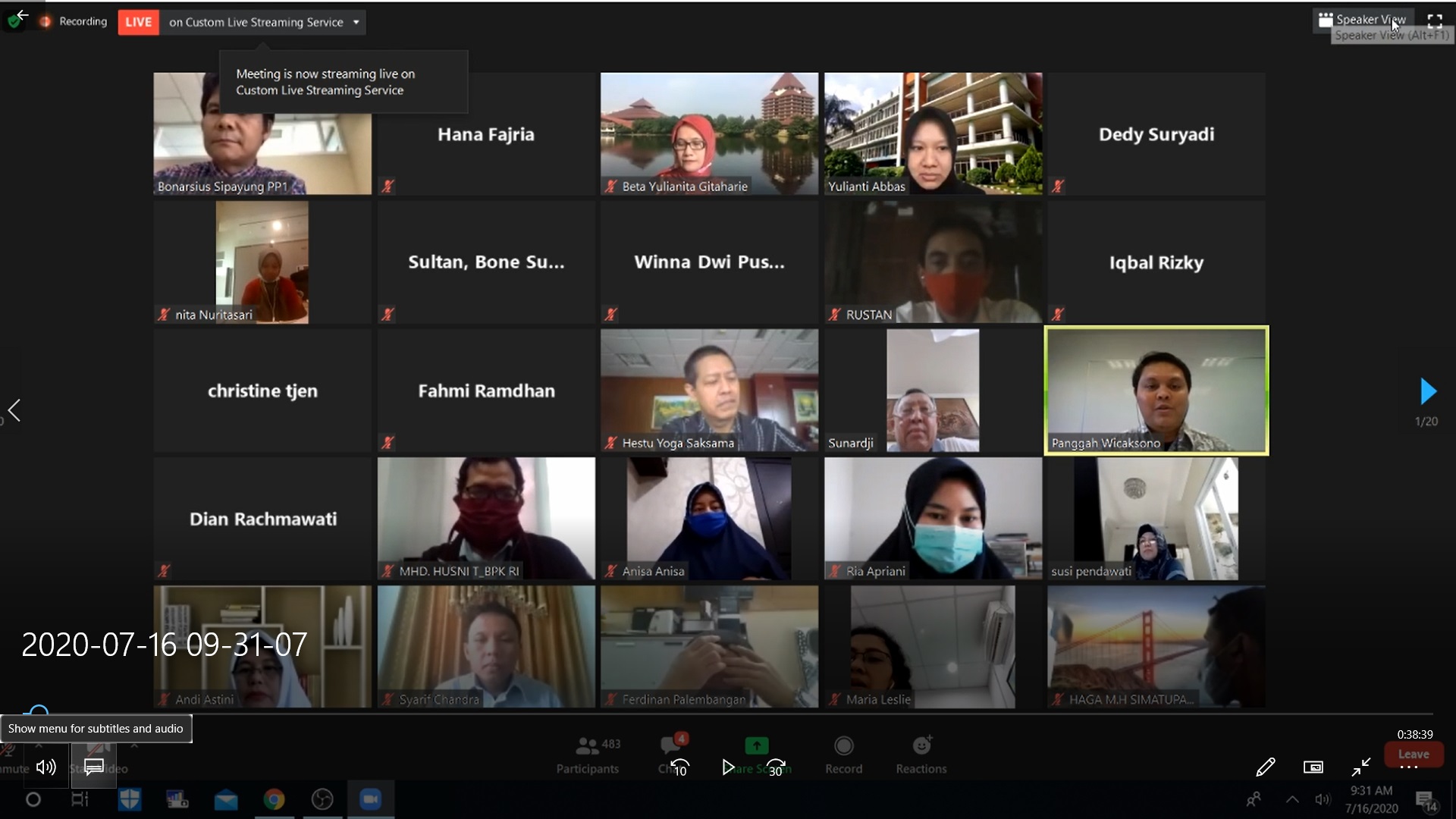TERC’s Tax Update: VAT on Trading through Electronic Systems (PMSE)
Hana Fajria –FEB UI Public Relations Office
DEPOK – The Tax Education and Research Center at the Economic and Community Research Institute, Faculty of Economics and Business, Universitas Indonesia (TERC-LPEM FEB UI), in collaboration with the Director General of Taxes, Ministry of Finance, held a webinar entitled “Tax Update: VAT on Trading Through Electronic Systems (PMSE)” on Thursday (16/7/2020).
Speakers at the webinar were Bonarsius Sipayung, S.E., Ak., M.Ak., Head of the VAT Regulations on VAT on Trade, Services and Other Indirect Taxes, Directorate General of Taxes (DGT), Ministry of Finance. Hestu Yoga Saksama, Ak., M.B.T, Director of Counseling, Services and Public Relations at DJP. The webinar was moderated by Christine Tjen, S.E., Ak., M.Int.Tax, CA., Coordinator of TERC-LPEM FEB UI.

Dr. Beta Yulianita Gitaharie, Acting Dean of FEB UI, said in her speech that the event was aimed at discussing new tax regulations, namely Finance Ministerial Regulation No. 48 Year 2020 and Director General of Taxes Regulation No. 12 Year 2020 concerning procedures for collecting, depositing and reporting of value added tax as well as value trading through electronic systems. She appreciated the tax update event as part of the effort to promote tax policies to the public as well as the academic community.

Hestu Yoga Saksama his keynote speech said that the background of the event was the implementation of the provisions of Article 6 paragraph (13) letter a of Law Number 2 Year 2020 concerning the passing of Government Regulation in Lieu of Law Number 1 Year 2020 concerning State Financial Policies and Financial System Stability for Covid-19 Handling, and in the context of dealing with threats that endanger the national economy and financial system stability, into law. The law aims at providing legal certainty in the collection of VAT on the use of intangible taxable goods and/or taxable services from outside the Customs Area, within the Customs Area, through Trading Through Electronic Systems (PMSE), as well as optimizing tax revenue.
The potential for tax revenue from trading through electronic systems will grow over time. According to him, if foreign digital companies are not taxed, it will be unfair for domestic entrepreneurs who have tax obligations. On the other hand, in terms of income tax on e-commerce, the government does not have the confidence as yet to collect corporate taxes from foreign digital companies. Therefore, the taxes imposed on income generated by digital economic activities can cause double taxation.
Bonarsius Sipayung explained the procedures for appointing collectors, collecting and depositing and reporting of value added tax on the use of intangible taxable goods and/or taxable services from outside the Customs area, within the Customs area and through PMSE.

“Domestic consumers are subject to a 10% value added tax for the use of (import) digital products in the form of intangible goods and services. The collection, deposit, and reporting of VAT on digital products originating from abroad will be carried out by trading business players through an electronic system (PMSE), namely foreign traders/service providers, foreign PMSE operators, or domestic PMSE operators appointed by the Minister Finance through the Director General of Taxes, starting in August 2020,” said Bonarsius.
VAT on the use of digital products originating from abroad is part of the government’s efforts to create a level playing field for all business players, especially between domestic and foreign players, as well as between conventional businesses and digital businesses.
With the enactment of this provision, digital products, such as subscriptions to music streaming, movie streaming, digital applications and games, as well as online services originating from abroad will be treated as conventional products consumed daily by people who are subject to VAT, as well as similar digital products produced by domestic business players.
PMSE business players who meet the criteria for a certain transaction value or amount of traffic within 12 months are appointed by the Minister of Finance through the Director General of Taxes as VAT collectors. Business players who have met the criteria but have not been appointed as VAT collectors can submit notifications online to the Director General of Taxes.
Just like domestic VAT collectors, appointed business players are also required to deposit and report VAT. VAT that have been collected from consumers must be deposited not later than the end of the following month, while reporting is made on a quarterly basis, not later than the end of the following month after the quarter ends.
In addition to giving equal treatment to all business players, VAT on digital products originating from abroad is also expected to increase state revenue that is currently very important as a source of funding to overcome the economic impact of the Covid-19 outbreak. The complete video can be accessed via the following link: https://www.youtube.com/watch?v=sA30Ynkwnhs (hjtp).
(lem)





